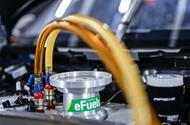We explain the production process and application of Porsche's e-fuels; used without mechanical modifications
Cars competing in this year’s Porsche Mobil 1 Supercup series will run on fuel that Porsche describes as “near carbon-neutralâ€.
The fuel is produced at the Haru Oni plant in Chile and created by synthesising renewable hydrogen made from electrolysis using wind-generated electricity. The CO2 also used to make the e-fuel comes from bio sources, although in future it will come from direct air capture (DAC).
The series has been run since 2021 using a second-generation, bio-based, partially synthetic fuel, but this year’s trial will be a first for the fully synthetic renewable fuel in its pure form.
Unlike production Porsches, the ECUs of which all share a stock engine map, the race cars’ ECUs are mapped manually, and Porsche says they have been programmed to suit the renewable fuel. The Supercup cars haven’t needed any other mechanical modifications.
Porsche describes its fuel as “near†carbon-neutral, but to be strictly accurate, aside from secondary CO2 generation from, say, transport and other factors, the raw fuel should be about as carbon-neutral as it’s possible to get for now. So how is it made?
The Haru Oni site was chosen because it’s consistently windy all year round: a turbine there can generate far more electricity than in European locations. It’s estimated the plant’s 3.4MW turbine can run at full load for an average of 270 days per year, compared with 66 days for the same turbine in Germany. The electricity it produces is used to electrolyse water to create renewable hydrogen.
Hydrogen and CO2 are heated at high pressure over a catalyst to produce methanol. The raw methanol is distilled to reduce its water content from 36% to 4% and then fed into a reactor that bonds the carbon atoms in the methanol together to form long hydrocarbon chains, which are the raw, synthetic petrol. After more processing, the final product emerges as 93 Octane petrol; after blending with additives the octane rating is raised to a minimum of 98.
The DAC project being worked on with the wider Volkswagen Group and other partners is still at the ‘proof of concept’ stage. Volkswagen established it should be commercially viable to capture CO2 from the air five years ago, and it is working with partners HIF Global and MAN Energy Solutions to show it can be done. A DAC plant can be set up anywhere there’s a source of renewable electricity.
The Porsche Mobil 1 Supercup series runs as part of the support programme at eight Formula 1 races this year, with the first being at Imola earlier this month. It’s predicted the 32 Cup cars will consume 50,000 litres of the renewable fuel during the season.
In comparison, the planned maximum annual output of the Haru Oni plant, which began producing at scale in 2022, is 130,000 litres. Porsche sees e-fuels as complementary to ramping up its share of electric cars, and it is still aiming at a global production mix of 80% pure-electric cars by 2030 as long as there’s demand for them.

